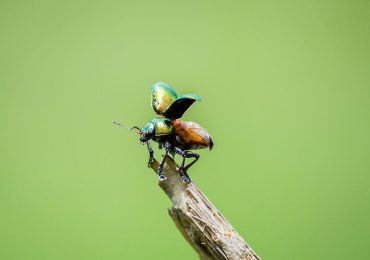The JRB presents poetry by the late Donald Parenzee.
~~~
Lightweight poem
Something of the heart’s left
just here over my shoulder
it seems to be, hovering
never actually leaving.
Sometimes on the bare table’s edge
you’d think it part of the fittings
but that’s not so, since when I leave
it moves with me.
The days are short and dense
with keys and eyes, fingered paper
and black pens losing themselves
through the reams, the spines
in the line-drawings of new designs
they are, these ties between meetings
taking me along passageways to the large
urban windows of the various workplaces.
A small, amenable shadow
usually lodges in the side pocket
or sits on the sleeve that’s hung
on the sixth-floor window casement.
Is it the air of our city
which fascinates, dreams itself
outward and upward, breathes
with the regional currents
at thirty-eight degrees
floating on a wave
this afternoon of sunlight
with its own kind of delicacy
like the way the wrist moves
when it slices tomato
with a certain kind of twist
a slight list to one side
holds the semi-golden juice,
seeds and all in one palm
as the other half rolls and stills
over the board.
Peace
No radio no anger. I’m a bit lost to tell the truth.
I want to learn the names of all these birds. Firstly
and then later, the language. So as to eavesdrop.
For now, I find it easy
to live without SAFM, or CCTV.
As for the mountain, the sea, well
they won’t go into retreat.
To tell the truth, to break a stone on power
just doesn’t seem right here. There is none.
Corruption’s a joke in bad taste.
Stones may be left unturned; inconsequent.
Truth may be made, unmade, like a bed you lie on.
It may be quite right to rest (my dark mantle),
to let the day crumble to its minutes.
There are truly strange things happening here –
yesterday a small moth walked toward me over the tiles
and nestled in the shadow under my shoe.
The sweet frogs of the bathroom.
The ducks in the tree at night.
This thing we call the garden. It’s just a word really.
The walls are just, well, walls. They’ll stand
for another century, maybe two?
Dp. Grahamstown. March ’14
At a writer’s retreat
Inside
for Cedric
Inside, under the wing, and bone also
the energy pooled in the shoulder
as pain, as impulse, waiting under the scapula
for that muscle flexure and release,
for some time now contained by windsound
aware without actually hearing,
regular accents coming through,
possibly clockwork pulses
occasional birdcalls
from a place of shade?
Or the deeper percussion
of clouds touching.
Already I could say: music
as if I had the language.
There’s a dimming and opening
of something someone might call
yellow, like a saxophone in shadow.
So every breath a question
each answer an exhalation,
I cannot possibly hear these names
I’m not familiar with the words.
But then a flicker,
a few drops onto the skin.
There’s a fine mesh uncurling
behind me, I don’t see.
New time
In memoriam: Anieyah Adams
(1)
Last souls leaving,
her entourage
letting go,
the hands,
cords hanging slack
along kerbstones
found in parks.
Nothing left
to ease their going.
Inward,
the wind,
and in the streets,
absence
greens and thickens,
blue panes
above the site.
(2)
They placed her
sideways
into wet clay,
the slipping
that day in rain
over stones dug out
over wet grass
while back at home
the rubber on the stoep,
the street longing,
just one more blessing
and boarded her up.
(3)
The men were innocent, largely silent
as the work was being done,
but not unaware of things sliding underfoot
in the tread soles. They were gentle,
casting arcs of brown,
orange-tainted soil (in that light)
shoring up her grave, shoring her memory.
(4)
So now when we come to new time
what do you say so now what song
do you say we should sing, now
as I sit on your bench outside the window,
the prayer of the men behind me
on the boards of your emptied room
in a musical language I cannot understand
completely, your answers, your questions
rise here on the bench:
there’s the bay, in its last year now,
there’s the night it will remain;
What will you turn away from?
This last house in this final street.
© Donald Parenzee, 2022
- Donald Parenzee (1948–2022) was an architect and architecture lecturer, a poet, an anti-apartheid cultural activist since youth, active in literacy and creative writing programs during the nineteen-eighties with the Congress of South African Writers, and later a curator-manager of exhibitions at the District Six Museum. His first volume of poetry, Driven to Work, appeared in 1985, published by Ravan Press as part of their Staffrider Series. In 1998, he published, as part of a trio with Vonani Bila and Alan Finlay, No Free Sleeping (Botsotso Publishing). He remained active in poetry, reading at local events and internationally, and was a Mellon Writer in Residence at Rhodes University in 2014. Hamba Kahle.






Brilliant poetry
It’s such a tragedy that one has to die first before your work is recognized. You don’t exist until then… Says so much about the power politics at play in the literary criticism domains of our world and who decides what has value… and when….
Almost like everything else in the world, especially in the art world, I’d say, where visibility is limited by the single factor of the artistic tastes of those who hold the reins to visibility. I discover gems in personal blogs regularly, and here we are discovering Parenzee post-mortem. For that, I spend hours per day searching. I am rewarded regularly.